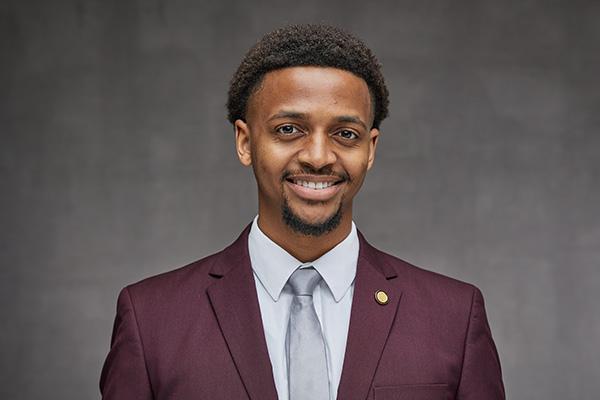Spotlight on Samuel O. Ndukwe, MMCi

It took until he was 20 years old before Samuel Ndukwe first saw a physician who looked like him. Recognizing that representation matters, the second-year Duke medical student is now doing all he can to make sure young Black men see themselves represented in the medical field much earlier than he did.
In this month’s spotlight, Ndukwe discusses his work as founder and president of Duke’s chapter of Black Men in White Coats. He shares how the organization is giving hope and inspiration to young Black men and his desire for the organization to help address the disparity in the number of Black men enrolling in medical school. He also reveals how spending time with loved ones and connecting with his church community helps keep him grounded.
Why did you choose to come to Duke for medical school? What have you enjoyed most about your time as a student?
During my visit to Duke University School of Medicine, I was embraced by several Black faculty members and students who showed me that I could be my authentic self at this university. As one of the few Black men at DUSOM, I feel that my unique perspective on medicine and community development has been supported by my peers and professors. From late-night study sessions in the medical school to shooting hoops with residents in the gym, I have created timeless memories that affirm that I made the right decision in choosing Duke for medical school. The inclusive community here at Duke is one of the most appealing qualities of its medical program. Additionally, as a Raleigh native, attending Duke for medical school has allowed me to stay connected to my family and the essential support systems that keep me grounded.
You are the founder and current president of the Duke chapter of Black Men in White Coats. Tell us a little about the organization and what motivated you to start a chapter at Duke.
Yes, I am the founder and current president of the Duke chapter of Black Men in White Coats (BMWC) – an organization committed to increasing the number of Black men in the field of medicine through exposure, inspiration, and unity. As the Duke chapter, we have a strong bias for supporting the Durham youth by exposing them to medical professionals who look like them and connecting local historically black university students to renowned medical institutions like Duke University School of Medicine. I was inspired to initiate the Duke chapter of BMWC after seeing the positive impact that other chapters were having on their medical students and surrounding communities. Dr. Kevin Thomas, my peers, and I saw the immense benefit of creating a safe space for Black men here at DUSOM and the opportunity to serve disadvantaged Durham community members and young scholars.
Why is an organization like Black Men in White Coats needed? Why is diversity in medicine important?
There is a notable disparity in the number of Black men matriculating to medical school in this country (less than there were in 1979). It is seen in the hospital and felt in the community. Recent studies have shown that patients tend to have better health outcomes when cared for by providers who look like them. Furthermore, representation is crucial to inspire younger students who may have never seen a doctor who shares a similar background as them. For instance, the first Black male physician I saw was a UNC faculty member when I was 20 years old in college. Diversity in medicine offers more meaningful career opportunities for young scholars, particularly Black men who are often stereotyped and underestimated regarding their academic capabilities.
Have you always had an interest in work related to equity, diversity, and inclusion (EDI)? If so, what inspired you to focus on this kind of work?
I have always been passionate about EDI-related work as a result of my educational and professional experiences where I was almost always underrepresented. In high school, I was one of only a few Black men in the International Baccalaureate program. I attended UNC-Chapel Hill for college – a predominately white institution – where I majored in health policy & management, a program where I was the only Black male in my cohort. Now, in my clinical year at DUSOM, I am more often than not the only Black man in the clinic. However, this has not discouraged me, rather, it drives me to create the changes I have always yearned for in my youth through community engagement, mentorship, and academic coaching of disadvantaged students like myself. I believe this is what God has created me to do.
What do you hope to do after medical school?
After medical school, I hope to attend a quality residency program for physician training and continue to develop programs to support young scholars who aspire to enter the medical field. I hope to change how Black men are seen in medicine and demonstrate how Black men can achieve notable success in professions we are often excluded from.
What passions or hobbies do you have outside of medical school?
Outside of medical school, I love spending time with my family and friends, enjoying different restaurants in Durham, playing basketball, and listening to music. Medical school has been an amazing experience, but it is very challenging as well, so I prioritize quality time with those I love and participate in fun hobbies to relieve stress. Additionally, I spend a great deal of time with my church community exploring my faith. All of these things keep me grounded throughout the ebbs and flows of medical training.